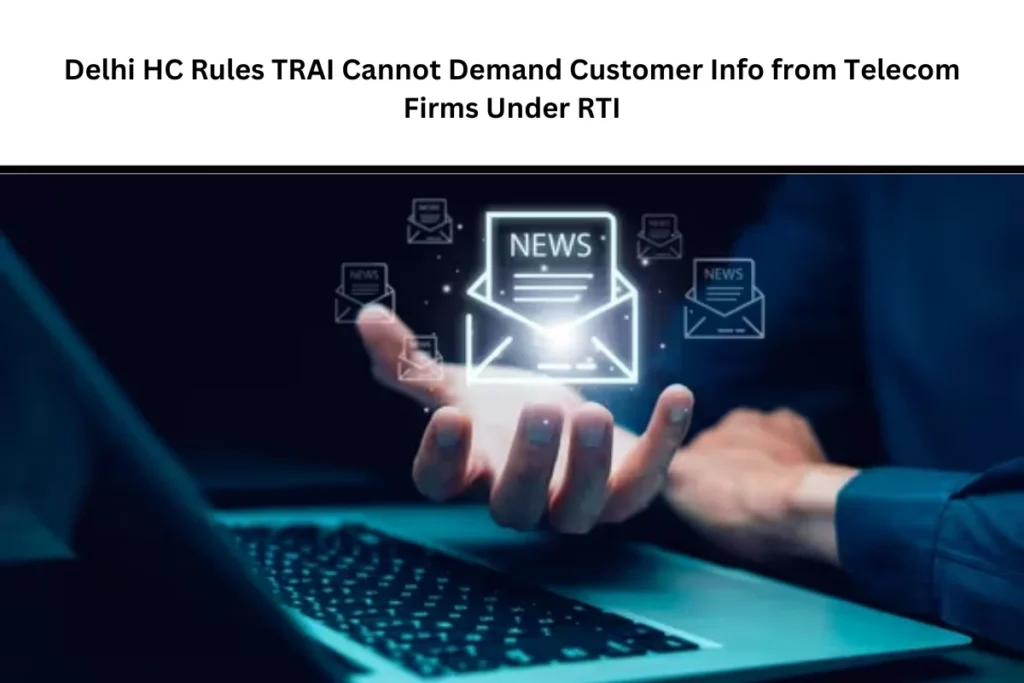
Delhi HC: TRAI Not Obligated to Provide Customer Information via RTI
The Delhi High Court overturned a Central Information Commission (CIC) order that had directed TRAI to request information from a telecom service provider and share it with a customer under the Right to Information (RTI) Act.
Justice Sanjeev Narula clarified that TRAI’s authority to seek data from telecom companies only applies to its regulatory duties. The court emphasized that TRAI cannot intervene in personal grievances or obtain customer-specific information for RTI purposes.
Court Finds CIC Overstepped Its Authority
The court criticized the CIC for going beyond its legal mandate. It stated that the CIC’s suggestion for the complainant to pursue the matter before a consumer disputes redressal forum was misplaced.
“TRAI is not a service provider or consumer under the Consumer Protection Act,” the court observed.
The court added that any complaints against TRAI should be addressed to the Telecom Disputes Settlement and Appellate Tribunal (TDSAT), not through RTI applications.
Background of the Case
The issue began when a consumer filed a complaint against Vodafone for altering his ‘Do Not Disturb’ (DND) status without his consent. Despite registering for the fully blocked category under the National Do Not Call Registry, he continued receiving unsolicited communications.
After his complaints to Vodafone went unanswered, he sought information under the RTI Act about the status of his grievances.
Although the Central Public Information Officer (CPIO) provided some details, the consumer remained dissatisfied. He escalated the matter to the CIC, which, in June 2024, directed TRAI to collect the requested information from Vodafone.
TRAI’s Plea in High Court
TRAI challenged the CIC order, arguing that the directive misinterpreted TRAI’s powers under the TRAI Act. The regulatory body stressed that its primary role is to regulate the telecom sector, not to handle individual complaints.
The court agreed with TRAI’s stance, noting that expanding TRAI’s responsibilities to include obtaining customer-specific data under the RTI Act would be legally unsound.
“The CIC erred in directing TRAI to requisition information from Vodafone and provide it under the RTI Act,” the court held in its January 7 order.
Consumer Complaints About Unsolicited Calls
The court acknowledged that unsolicited commercial communications remain a serious issue. It noted that this problem affects a large number of people, and effective solutions are needed.
However, the court clarified that TRAI’s powers are limited to regulation and enforcement. Handling individual grievances is outside its scope.
TRAI’s Role in Telecom Disputes
| Entity | Function | Jurisdiction |
|---|---|---|
| TRAI | Regulates telecom services | Sector-wide issues |
| TDSAT | Resolves telecom disputes | Consumer complaints |
| CIC | Oversees RTI applications | Information-related matters |
Conclusion
The Delhi High Court’s verdict highlights the boundaries of TRAI’s powers. The ruling also serves as a reminder that individual grievances against telecom providers should be resolved through consumer courts or TDSAT, not through the RTI Act.
As the February 2025 deadline for TRAI’s regulatory commitments approaches, the focus remains on addressing unsolicited communications while ensuring regulatory clarity in the telecom sector.
for more updates follow ANN MEDIA on facebook , X , Instagram and Linkedin







